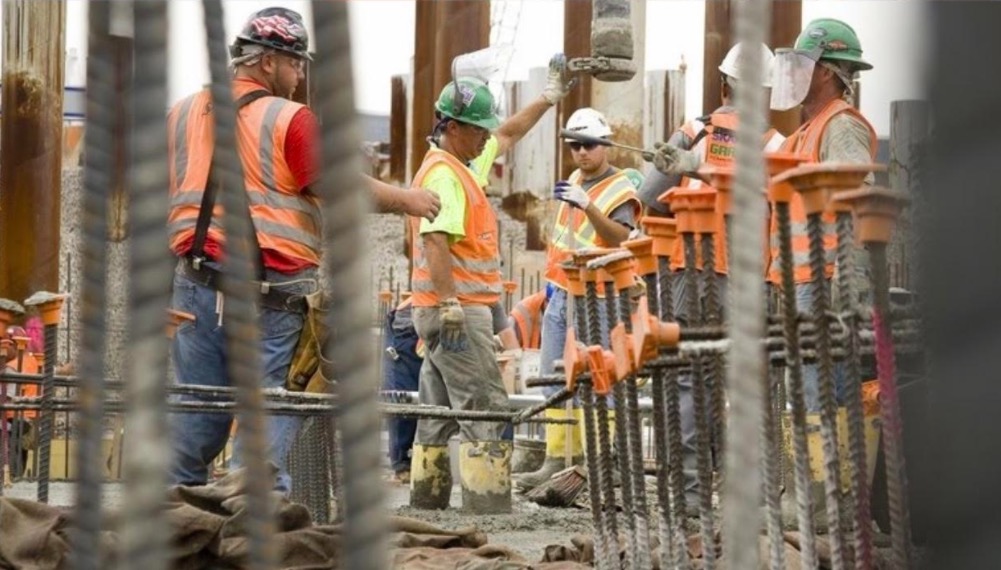We Build
Amidst the bricks and boards and witty banter, we are building men.

I was on site the other day and the guys were up to their usual monkey business – ripping on each other, cracking jokes, making fun. A full day on a construction site can be hard, and crews keep spirits up with humor and teasing.
I spent just over 18 years on site. For the last seven years, I’ve worked on the project management side and have traded frozen toes for sleepless nights. I don’t come home with mortar in my pockets anymore. Now I have the privilege of waking up at three o’clock in the morning worried that the budget will run out before the flooring crew rolls up. Any way you look at it, construction comes with a helping of pain.
We take pride in being able to endure that pain. From hod carriers, to plumbers, to foremen, to superintendents, to developers; construction demands endurance. We take materials and cut, shape, join and polish them into structures that people will live and work in. The tools are sharp. The conditions are inhospitable. The pressures are constant.
Construction sites are, for the most part, men’s spaces. That guy in the truck commercial with his tools, two-day beard and work coat – that is the guy I spend my days with. There’s a camaraderie, a language and a socialization that comes with the work. Every carpenter I know has been sent to fetch the “board stretcher” from the truck, only to sheepishly return empty handed, greeted by a crew howling with laughter.
We share something. We share an experience of building beautiful spaces from unshaped materials in the harshest of conditions.
We are also building something much more durable. Amidst the bricks and boards and witty banter, we are building men. More specifically; we are shaping manhood. This process of socialization happens on construction sites, and occurs every time and in every place we tell men and boys what it means to be a man. It begins when we are infants and by the time we are 10 years old, each of us is expected to have a nuanced understanding of what it means to be a “man.”
On job sites and off, men are socialized to define ourselves by devaluing women and girls. We use gender-based attributes to bully and discriminate. The message couldn’t be more clear; men are strong which means women are weak. That is the message I was given the other day.
I arrived mid-morning, stepped out of my comfortable, heated truck in a freshly pressed shirt, and a guy on site called me a p***y. I remember my days covered in dirt and mortar, with a smashed thumb and no feeling in my toes. From that place in the trenches, the relative comfort of project management is frustrating. The boss gets the credit while the crew suffers in the snow. It’s raw classism.
He was up to his elbows in dirt and rubble preparing to pour a new slab in an old adobe house, and he was calling me weak. He was making fun of me for having lost my calluses. He was questioning my manhood and elevating his own.
I looked at him and said with a big smile, “Thank you!” The whole crew laughed. “I take it as a compliment that you see me as strong as a woman. Bringing forth human life is a challenge no man is built for.” The shovels stopped scraping. The men were thinking. I heard one of them say to another, “I never thought about it that way… he’s kinda got a point…”
“One more thing,” I continued, “I am fine with you teasing and pushing on me. But don’t use that word or any other words that bring women and girls down. That doesn’t fly with me.”
Violence against women and girls is an epidemic in our country. We get that, but what many men don’t always get is that the way we treat each other devalues women and creates a culture where violence against women and girls thrives. Calling another man a p***y is telling him he is weak, like a woman, and that being weak is bad.
Construction is hard, but it’s not proof of my manhood or anyone else’s. Plenty of structures have been built by women, trans gendered men and women, gender non-conforming and non-binary people.
When men associate weakness with less value and categorize women as weak by nature, not only do we hurt women, we limit ourselves. There are times when I am weak. This does not take away from the days I have endured 15-degree weather putting shingles on a roof. Embracing those weak moments allows me to be whole. Besides, I don’t want my manhood built on the back of someone else.
One in every six American women are victims of rape or attempted rape in their lifetime. Men don’t rape for sexual gratification; they do it to exert power. They do it to “be strong.” They take away another person’s power to try and shore up their own.
These are complicated conversations to have on a job site. The guys sometimes hear me and sometimes shake their heads. Some are exploring their vulnerability and realizing that they lose nothing in the process. Some are holding on to rigid notions of manhood that research links to increased violence against women and girls. But overall, I see change. It’s slow, but it is happening.
At A CALL TO MEN, we educate all men and boys about healthy, respectful manhood and its link to preventing violence against all women and girls. Not only will all women and girls become valued and safe, but all men will have the freedom to be their whole, authentic selves.
– Scott Davis, Trainer, A CALL TO MEN